八年级下册情态动词讲解1
八年级情态动词的知识点
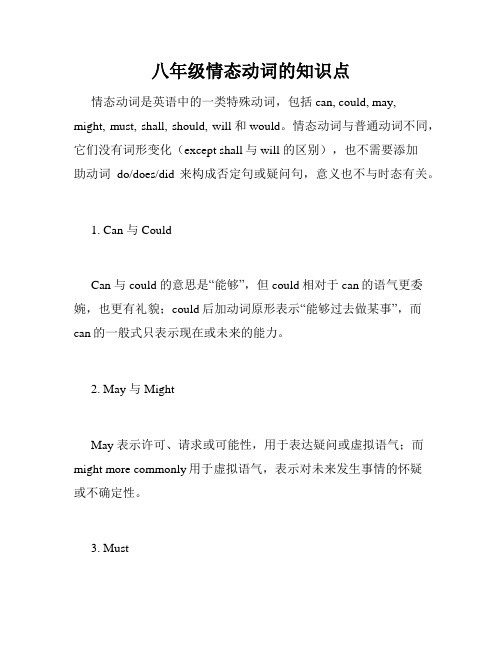
八年级情态动词的知识点情态动词是英语中的一类特殊动词,包括can, could, may, might, must, shall, should, will和would。
情态动词与普通动词不同,它们没有词形变化(except shall与will 的区别),也不需要添加助动词do/does/did来构成否定句或疑问句,意义也不与时态有关。
1. Can 与 CouldCan 与could 的意思是“能够”,但could相对于can的语气更委婉,也更有礼貌;could后加动词原形表示“能够过去做某事”,而can的一般式只表示现在或未来的能力。
2. May 与 MightMay 表示许可、请求或可能性,用于表达疑问或虚拟语气;而might more commonly用于虚拟语气,表示对未来发生事情的怀疑或不确定性。
3. MustMust强调必须、不可避免,表示绝对肯定或高度推断;用于表达命令或建议,以及对情况的强烈表示。
4. Shall 与 ShouldShall 和should用于表达命令、请求或建议,但shall主要用于将来时,而should则是一种情态动词,强调道义义务和道义要求,较具有礼貌和客观性。
5. Will 与 WouldWill 表示将要发生的事情,也表示愿望或决心;Would则常用于虚拟语气和条件句,表示假设、愿望或敬语。
6. Can与May的用法差异Can 表示某人能够做某事,能力在第一位。
而may则强调许可、允许的意义,是语气委婉的表达方式。
7. Should与Would的用法差异Should是一种道义上的情态动词,引申出一定的礼貌和可能性;而would则更多地表示愿望和推测,即假设的语气。
8. Must 和Have to两者不同点:must是限定词,have to 则比较口语化,常用于口语中;must表示主观推断,而have to则表示客观事实。
9. 动词原型与情态动词连用情态动词和动词原形连用是比较常见的用法。
情态动词用法归纳(全)(1)
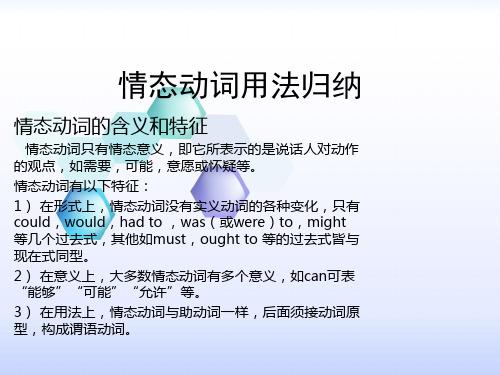
2) need 作情态动词用时, 常用于疑问句、否定句。在肯定句 中一般用must, have to, ought to, should代替。
1.You needn’t come so early. 2. ---- Need I finish the work today?
---- Yes, you must. / No, you needn’t.
may(might)有以下几种形式:
时态 现在式 过去式
肯定式 may might
否定式 缩略否定式
may not
mayn't
might not mightn't
may(might)的基本用法:
1)表可能,暗含不确定,等于possibly,perhaps,maybe,如: He may be busy getting ready for his trip. 他也许在忙于准备外出旅游。
You might ask before you borrow my car. 你可以先问问我再借我的车子嘛。
you might have helped me. 你完全可以帮我一把的呀。
4)May 与might的比较:
might 可表虚拟语气,may则不可以,如: It might help a little if you would only keep clean .
He should do some work,but he doesn't want to 他应该做些工作,但是他不想做。
4)表推测,暗含很大的可能,如:
The film should be very good as it is starring first-class actors. 这部电影是一流的演员主演的,可能拍得很好。
八年级情态动词知识点总结
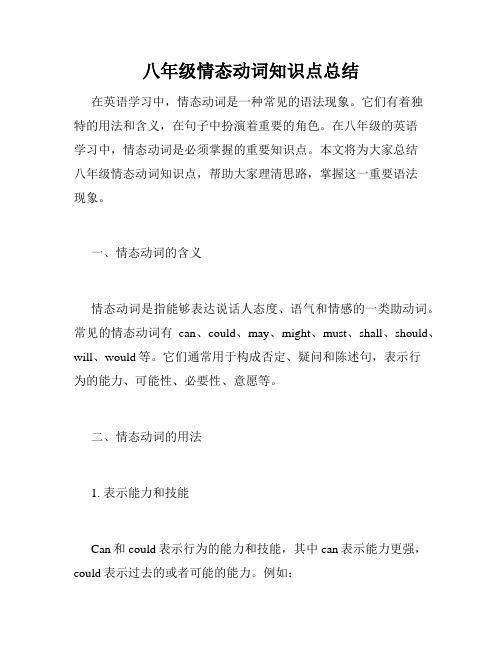
八年级情态动词知识点总结在英语学习中,情态动词是一种常见的语法现象。
它们有着独特的用法和含义,在句子中扮演着重要的角色。
在八年级的英语学习中,情态动词是必须掌握的重要知识点。
本文将为大家总结八年级情态动词知识点,帮助大家理清思路,掌握这一重要语法现象。
一、情态动词的含义情态动词是指能够表达说话人态度、语气和情感的一类助动词。
常见的情态动词有can、could、may、might、must、shall、should、will、would等。
它们通常用于构成否定、疑问和陈述句,表示行为的能力、可能性、必要性、意愿等。
二、情态动词的用法1. 表示能力和技能Can和could表示行为的能力和技能,其中can表示能力更强,could表示过去的或者可能的能力。
例如:He can swim very fast.(他游泳很快。
)She could play the piano when she was young.(她小时候会弹钢琴。
)2. 表示推测和可能性May、might和could用于表示可能性和推测,其中may表示可能性更大,could表示可能性更小。
例如:It may rain tomorrow.(明天可能下雨。
)He might be at home.(他可能在家里。
)3. 表示必要性和义务Must表示强制性的必要性,should表示建议性的必要性,其中must用于肯定句和疑问句,should用于陈述句中。
例如:You must wear a seatbelt while driving.(开车时你必须系上安全带。
)You should eat more vegetables.(你应该多吃蔬菜。
)4. 表示意愿和请求Will、would和can用于表示意愿和请求,其中will和would用于陈述句和状语从句中,can用于疑问句和请求。
例如:He will help me with my homework.(他会帮我完成作业。
人教版英语八年级下册Unit1 (语法透视):情态动词的用法解析
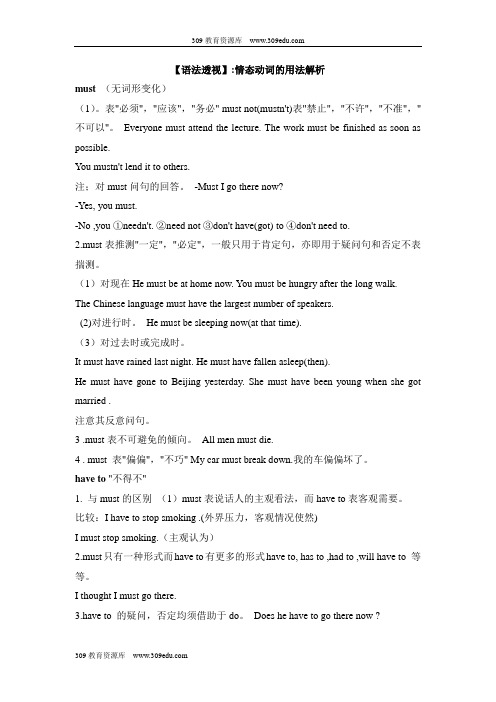
【语法透视】:情态动词的用法解析must(无词形变化)(1)。
表"必须","应该","务必" must not(mustn't)表"禁止","不许","不准","不可以"。
Everyone must attend the lecture. The work must be finished as soon as possible.You mustn't lend it to others.注;对must问句的回答。
-Must I go there now?-Yes, you must.-No ,you ①needn't. ②need not ③don't have(got) to ④don't need to.2.must表推测"一定","必定",一般只用于肯定句,亦即用于疑问句和否定不表揣测。
(1)对现在He must be at home now. You must be hungry after the long walk.The Chinese language must have the largest number of speakers.(2)对进行时。
He must be sleeping now(at that time).(3)对过去时或完成时。
It must have rained last night. He must have fallen asleep(then).He must have gone to Beijing yesterday. She must have been young when she got married .注意其反意问句。
初二英语情态动词的具体用法全面解析

初二英语情态动词的具体用法全面解析【考纲解读】根据对情态动词部分在全国各地中考试题的分析可知,今后该部分将是重点考查点之一。
其考查重点为:1、情态动词在一般疑问句中的问与答2、情态动词表示猜测的用法3、will与shall的用法4、dare与need的用法【知识点梳理】情态动词的具体用法:(一)情态动词概说1.情态动词也是“辅助性”动词,用来表示说话人的语气或情态。
情态动词所表示的情态有:请求、命令、允诺、可能、需要、敢于、愿望、义务、能力等。
2.情态动词本身有词义,但词义不完全,不能单独用作谓语,没有人称和数的变化,且后面只跟动词原形。
如:她会唱英文歌曲。
She cans sing an English song.(F)She can sings an English song.(F)She can sing an English song.(T)3.有些情态动词的过去时与其原形相同,有些与原形不同。
(1) 与原形相同的有:must --- must ought to --- ought to(2) 与原形不同的有:can --- could will --- wouldmay --- might shall --- shouldneed --- needed dare --- dared have to --- had to(二)情态动词的种类:(见下表)(三)情态动词的否定形式:cannot --- can’t could not --- couldn’t may not--- mayn’tmight not--- mightn’t must not --- mustn’t will not --- won’twould not --- wouldn’t need not --- needn’t shall not --- shan’tshould not --- shouldn’t ought not --- oughtn’t dare not --- daren’t(四)常用情态动词的用法:1.can与could1). can(1)表示体力或脑力方面的“能力”,也能表示根据客观条件能做某事的“能力”。
八年级情态动词知识点归纳
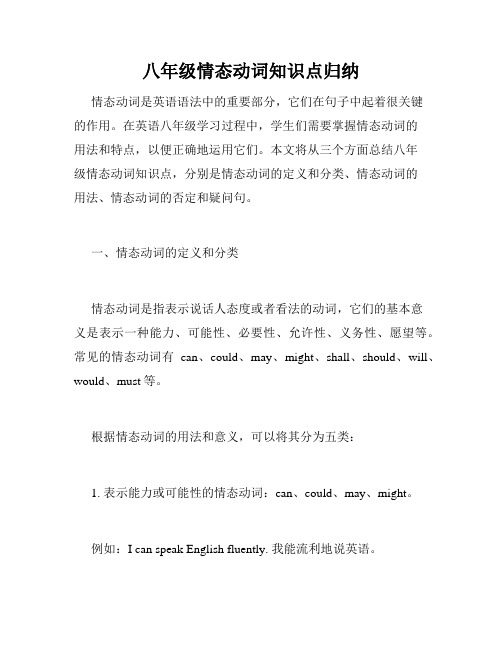
八年级情态动词知识点归纳情态动词是英语语法中的重要部分,它们在句子中起着很关键的作用。
在英语八年级学习过程中,学生们需要掌握情态动词的用法和特点,以便正确地运用它们。
本文将从三个方面总结八年级情态动词知识点,分别是情态动词的定义和分类、情态动词的用法、情态动词的否定和疑问句。
一、情态动词的定义和分类情态动词是指表示说话人态度或者看法的动词,它们的基本意义是表示一种能力、可能性、必要性、允许性、义务性、愿望等。
常见的情态动词有can、could、may、might、shall、should、will、would、must等。
根据情态动词的用法和意义,可以将其分为五类:1. 表示能力或可能性的情态动词:can、could、may、might。
例如:I can speak English fluently. 我能流利地说英语。
2. 表示建议或命令的情态动词:shall、should。
例如:You should go to bed early. 你应该早点睡觉。
3. 表示必要性或义务的情态动词:must、have to。
例如:You must finish your homework. 你必须完成你的作业。
4. 表示意愿或决心的情态动词:will、would。
例如:I will help you with your English. 我会帮你做英语。
5. 表示推测和猜测的情态动词:may、might、could。
例如:He may be late for the meeting. 他也许会迟到会议。
二、情态动词的用法情态动词的用法有以下几点:1. 情态动词后面要接动词原形。
例如:I can swim. 我会游泳。
2. 情态动词没有人称和数的变化。
例如:You can ride a bike. 你会骑自行车。
3. 情态动词不能单独作为谓语动词,必须与其他动词一起使用。
例如:She should study harder. 她应该更努力地学习。
情态动词知识点
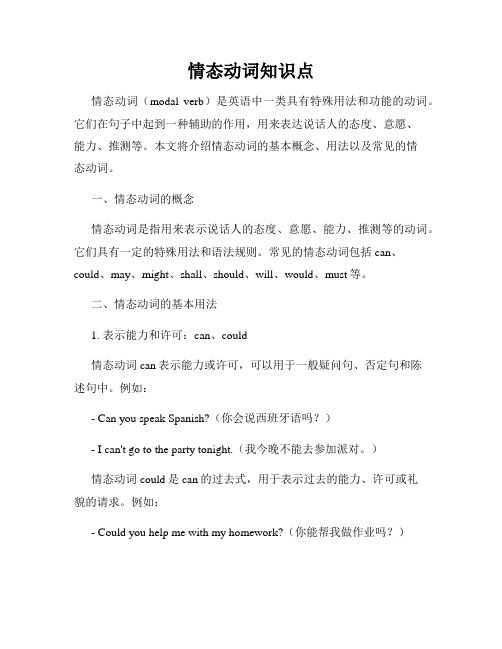
情态动词知识点情态动词(modal verb)是英语中一类具有特殊用法和功能的动词。
它们在句子中起到一种辅助的作用,用来表达说话人的态度、意愿、能力、推测等。
本文将介绍情态动词的基本概念、用法以及常见的情态动词。
一、情态动词的概念情态动词是指用来表示说话人的态度、意愿、能力、推测等的动词。
它们具有一定的特殊用法和语法规则。
常见的情态动词包括can、could、may、might、shall、should、will、would、must等。
二、情态动词的基本用法1. 表示能力和许可:can、could情态动词can表示能力或许可,可以用于一般疑问句、否定句和陈述句中。
例如:- Can you speak Spanish?(你会说西班牙语吗?)- I can't go to the party tonight.(我今晚不能去参加派对。
)情态动词could是can的过去式,用于表示过去的能力、许可或礼貌的请求。
例如:- Could you help me with my homework?(你能帮我做作业吗?)- She could run very fast when she was young.(她年轻时能跑得很快。
)2. 表示可能性和推测:may、might情态动词may和might用于表示可能性或推测,表示事物发生的可能性更大。
might的语气较虚弱,使用较少。
例如:- It may rain tomorrow, so take an umbrella with you.(明天可能会下雨,所以带把伞。
)- He might be busy.(他可能很忙。
)3. 表示义务和建议:shall、should情态动词shall用于第一人称和第三人称中,表示义务或将来的行为。
should用于各种人称中,表示建议或应该的动作。
例如:- Shall I open the window?(我应该打开窗户吗?)- You should eat more fruits and vegetables.(你应该多吃水果和蔬菜。
情态动词总结知识点
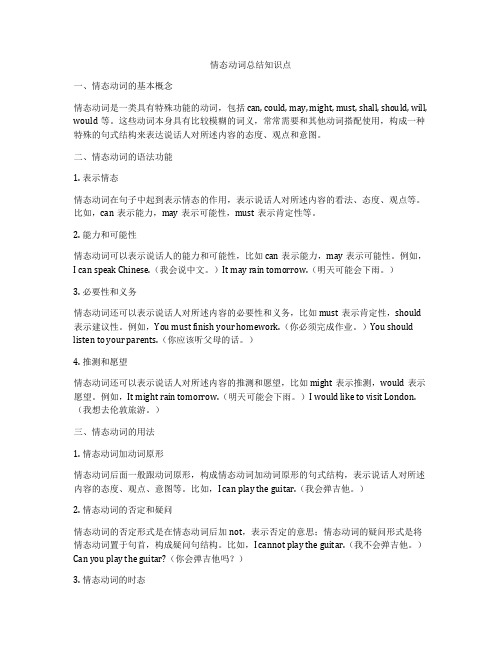
情态动词总结知识点一、情态动词的基本概念情态动词是一类具有特殊功能的动词,包括can, could, may, might, must, shall, should, will, would等。
这些动词本身具有比较模糊的词义,常常需要和其他动词搭配使用,构成一种特殊的句式结构来表达说话人对所述内容的态度、观点和意图。
二、情态动词的语法功能1. 表示情态情态动词在句子中起到表示情态的作用,表示说话人对所述内容的看法、态度、观点等。
比如,can表示能力,may表示可能性,must表示肯定性等。
2. 能力和可能性情态动词可以表示说话人的能力和可能性,比如can表示能力,may表示可能性。
例如,I can speak Chinese.(我会说中文。
)It may rain tomorrow.(明天可能会下雨。
)3. 必要性和义务情态动词还可以表示说话人对所述内容的必要性和义务,比如must表示肯定性,should 表示建议性。
例如,You must finish your homework.(你必须完成作业。
)You should listen to your parents.(你应该听父母的话。
)4. 推测和愿望情态动词还可以表示说话人对所述内容的推测和愿望,比如might表示推测,would表示愿望。
例如,It might rain tomorrow.(明天可能会下雨。
)I would like to visit London.(我想去伦敦旅游。
)三、情态动词的用法1. 情态动词加动词原形情态动词后面一般跟动词原形,构成情态动词加动词原形的句式结构,表示说话人对所述内容的态度、观点、意图等。
比如,I can play the guitar.(我会弹吉他。
)2. 情态动词的否定和疑问情态动词的否定形式是在情态动词后加not,表示否定的意思;情态动词的疑问形式是将情态动词置于句首,构成疑问句结构。
比如,I cannot play the guitar.(我不会弹吉他。
初中英语中的情态动词用法解析

初中英语中的情态动词用法解析情态动词是英语中一个非常重要的语法现象,它们在句子中起到了承上启下的作用。
在初中英语学习中,我们经常会遇到情态动词的使用,但是很多学生对其用法还存在一些困惑。
本文将详细解析初中英语中的情态动词用法,帮助大家更好地理解和运用。
一、情态动词的定义和特点情态动词是一类特殊的助动词,用来表示说话人对某种行为或状态的态度、意愿、推测、能力等。
常见的情态动词包括can、could、may、might、must、shall、should、will、would等。
情态动词具有以下特点:1. 情态动词没有人称和数的变化,即主语是什么,情态动词就是什么形式。
2. 情态动词后面直接跟动词原形,不加to。
3. 情态动词本身没有时态,它们通过上下文来表示不同的时态。
4. 情态动词后面的动词要用原形,不能加-ing。
二、情态动词的用法1. 表示能力和可能性情态动词can表示能力,表示某人有能力做某事。
例如:I can swim.(我会游泳。
)情态动词may表示可能性,表示某事有可能发生。
例如:It may rain tomorrow.(明天可能会下雨。
)2. 表示许可和禁止情态动词can表示许可,表示某人允许做某事。
例如:Can I go to the park?(我可以去公园吗?)情态动词must表示禁止,表示某人不允许做某事。
例如:You must not smoke here.(你不能在这里吸烟。
)3. 表示推测和猜测情态动词may和might表示推测,表示某事可能发生或某人可能做某事。
例如:He may be busy.(他可能很忙。
)情态动词must表示肯定的推测,表示某事几乎可以肯定。
例如:She must be tired.(她一定很累。
)4. 表示义务和建议情态动词must表示义务,表示某人有责任做某事。
例如:You must finish your homework.(你必须完成作业。
初二下情态动词用法
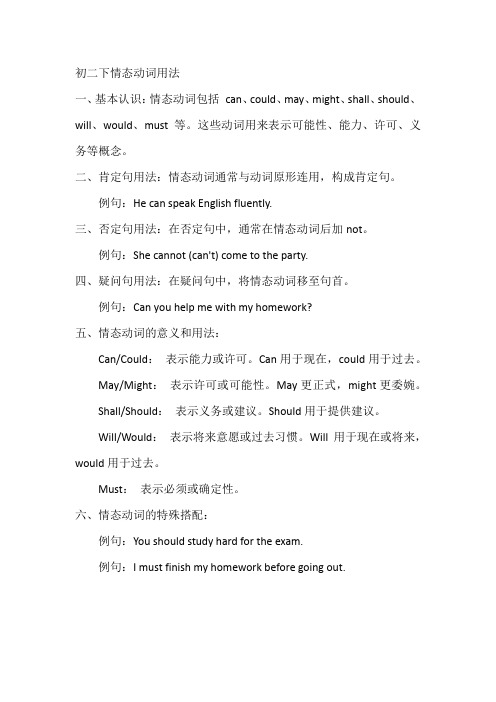
初二下情态动词用法
一、基本认识:情态动词包括can、could、may、might、shall、should、will、would、must等。
这些动词用来表示可能性、能力、许可、义务等概念。
二、肯定句用法:情态动词通常与动词原形连用,构成肯定句。
例句:He can speak English fluently.
三、否定句用法:在否定句中,通常在情态动词后加not。
例句:She cannot (can't) come to the party.
四、疑问句用法:在疑问句中,将情态动词移至句首。
例句:Can you help me with my homework?
五、情态动词的意义和用法:
Can/Could:表示能力或许可。
Can用于现在,could用于过去。
May/Might:表示许可或可能性。
May更正式,might更委婉。
Shall/Should:表示义务或建议。
Should用于提供建议。
Will/Would:表示将来意愿或过去习惯。
Will用于现在或将来,would用于过去。
Must:表示必须或确定性。
六、情态动词的特殊搭配:
例句:You should study hard for the exam.
例句:I must finish my homework before going out.。
情态动词知识点

情态动词知识点情态动词(Modal Verbs)是英语中的一类特殊动词,用于表示说话人的态度、观点、意愿、能力、推测等。
了解和正确使用情态动词对学习英语语法和提高语言表达能力非常重要。
本文将介绍情态动词的基本知识点,包括定义、用法及常见情态动词的具体用法和表示的含义。
一、情态动词的定义和用法情态动词是一类特殊的助动词,常用的情态动词有can、could、may、might、must、shall、should、will、would等。
情态动词有以下几个特点:1. 情态动词本身没有词义,不能单独用作谓语,后面需加动词原形来构成句子。
2. 情态动词本身没有人称和数的变化。
3. 情态动词没有时态的变化,表示的是一种情态或态度,并不表示动作的时间或进行的状态。
情态动词主要用于以下几个方面的功能:1. 表示能力和可能性:can、could、may、might、must;2. 表示推测和可能性:may、might、could;3. 表示意愿和请求:will、would、shall、should;4. 表示命令和建议:shall、should、will、would;5. 表示义务和必要性:must、should。
二、常见情态动词的具体用法和含义1. can/could:- 表示能力、技能:I can speak English fluently.- 表示允许:Can I use your computer?- 表示请求:Could you please help me carry this bag?- 表示推测:He could be at home.2. may/might:- 表示允许、请求、建议:May I come in? Might I suggest a different approach?- 表示推测、可能性:She may be busy. It might rain later.- 用于虚拟语气:If I had more time, I might go on vacation.3. must:- 表示必须、肯定:You must follow the rules.- 表示推测、非常有可能:He must be tired.- 表示责任、命令:You must finish the report by tomorrow.4. shall/should:- 表示建议、意愿、命令:Shall we go for a walk? You should see a doctor.- 表示期望、推测:The train should arrive soon.5. will/would:- 表示意愿、决心:I will help you with the project.- 表示请求、邀请:Would you like to join us for dinner?- 表示推测、意愿、假设:She would probably be upset if you didn't go.三、注意事项1. 情态动词后面的动词原形不带to。
人教版八年级下册英语Unit1SectionA情态动词单元语法聚焦一

玩得开心 自学 亲自
单独;独自 __随__便__吃__/_喝__…__…___
自学 自言自语 苏醒过来 自己穿衣服
5.Let's think about it before we find ourselves “between a rock and a hard place”, and before we have to make a decision that could mean life or death.让我们在发现自己身处“生死两难”的境地之前,
单元语法聚焦一
[注意] 第一、二人称的反身代词由形容词性物主代词加self(单数), selves(复数)构成;第三人称的反身代词由人称代词的宾格加self(单 数), selves(复数)构成。
单元语法聚焦一
2.常见的由反身代词构成的短语
enjoy oneself teach oneself
for oneself by oneself help oneself to… learn by oneself say to oneself come to oneself dress oneself
八年级下册
英语
新课标(RJ)
Unit 1 What's the matter?
Unit 1 What's the matter?
单元语法聚焦一
[情态动词should的用法及反身代词的用法 ]
单元语法聚焦一
一、情态动词should的用法 教材典句
1.What should I do?我应该做什么? 2.Should I take my temperature?我应该量体温吗? 3.I think you should lie down and rest.我认为你应该躺下来休息。 4.You shouldn't eat so much next time.下次你不应该吃那么多。 5.He should see a dentist and get an Xray.
八年级下册语法专题一:情态动词should与could知识讲解

八年级下册语法专题一:情态动词s h o u l d与c o u l d专题归类复习一情态动词should与could的用法●语法讲解1.should是情态动词shall的过去式,但有时并不表示过去。
(1)表示委婉的劝告或建议,意为“应该”。
如:You should hand in your composition at once.你应该立刻交上你的作文。
(2)表示可能性或推断,意为“可能;应该”。
如:I think they should be there now.我想他们现在应该在那里。
(3)用于特殊疑问句中,表示意外、惊奇、不能理解等强烈感情。
如:How should you know that?你是怎么知道那件事的?What should you do to relax?你该做什么来放松呢?2.could是情态动词can的过去式,但有时并不表示过去。
(1)表示提议,比can更客气、委婉。
I could do the shopping for you, if you are tired.如果你累了,我能帮你买东西。
(2)表示请求,语气比can更客气、委婉。
Could you show me the way to the hospital?你能告诉我去医院的路吗?●语法精练Ⅰ.单项选择( )1.Schools________allow students at least one houra day for sports.A.would B.mightC.should D.could( )2.________you tell me how to get to the postoffice?A.Must B.NeedC.Could D.Should( )3.—When can I come for the photos? I need themtomorrow afternoon.—They________be ready by 12:00.A.can B.shouldC.might D.need( )4.—Could I borrow your dictionary?—Of course you________.A.can B.mustC.should D.will( )5.The basketball________his.He loves playingbasketball.A.maybe B.may beC.may is D.may not( )6.We________keep the new traffic law and learn how to protect ourselves.A.will B.wouldC.shall D.should( )7.—Could you please help me do my homework?—Sorry.I________.You________do it by yourself.A.could; mayB.couldn't; shouldC.can't; shouldD.can't; may( )8.—How was the youth club last night, Mark?—It was great fun.You________come.A.must B.canC.should D.mayⅡ.根据句意用should或could填空1.Sally________make dumplings by herself when she was only five years old.2.In school, all the classmates__________get on wellwith each other.3.You________call her if you have something important to tell her.4.You_________not drive after drinking.5._________I use your mobile phone,please?。
人教版八年级英语下册 Unit1 知识点讲解
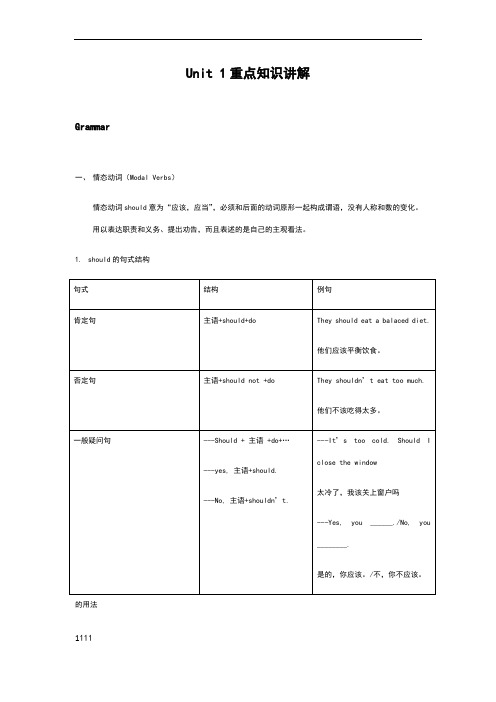
Unit 1重点知识讲解Grammar一、情态动词(Modal Verbs)情态动词should意为“应该,应当”,必须和后面的动词原形一起构成谓语,没有人称和数的变化。
用以表达职责和义务、提出劝告,而且表述的是自己的主观看法。
1.should的句式结构的用法注意:should在以why,who,how等疑问词开头的问句中,意为“竟然,居然,怎么会”,表示意外、惊喜或在说话人看来是不可思议的。
二、其他表示建议的句型三、反身代词表示反射或强调的代词叫做反身代词。
反身代词是由第一人称、第二人称形容词性物主代词或第三人称代词的宾格形式,词尾加self或selves组成。
反身代词可译“本人”、“本身”,为加强语气,也常翻译为“亲自”、“自己”。
不定人称代词one-----oneself.1、反身代词的分类2、反身代词的用法单词的用法Section A1.What’s the matter怎么了该句常用询问某人患了何种疾病或遇到了什么麻烦,其后用with引出对象。
1). What’s the matter with sb.=what’s wrong with sb.=what’s the trouble/problem with sb.=what’s one’s trouble/problem. What’s the matter with Tom=what’s _________ with Tom=What’s the _________ with Tom=What’s Tom’s _________2). matter, 名词,“问题,事情”. We have important _________(matter) to discuss.我们有些重要的问题要讨论。
3). 动词,“要紧,关系重大”. It dosen’t _________ that you came late.2.I have a cold.我感冒了。
(完整版)人教版八年级英语下册Unit1知识点讲解(可编辑修改word版)

Unit 1 重点知识讲解Grammar一、情态动词(Modal Verbs)情态动词should 意为“应该,应当”,必须和后面的动词原形一起构成谓语,没有人称和数的变化。
用以表达职责和义务、提出劝告,而且表述的是自己的主观看法。
1.should 的句式结构2.s hould 的用法喜或在说话人看来是不可思议的。
二、其他表示建议的句型表示反射或强调的代词叫做反身代词。
反身代词是由第一人称、第二人称形容词性物主代词或第三人称代词的宾格形式,词尾加self 或selves 组成。
反身代词可译“本人”、“本身”,为加强语气,也常翻译为“亲自”、“自己”。
不定人称代词one ---- oneself.1、反身代词的分类2、反身代词的用法单词的用法Section A1.What’s the matter?怎么了?该句常用询问某人患了何种疾病或遇到了什么麻烦,其后用with 引出对象。
1). What’s the matter with sb.?=what’s wrong with sb.?=what’s the trouble/problem with sb.?=what’s one’s trouble/problem?e.g. What’s the matter with Tom?=what’s with Tom?=What’s the with Tom?=What’s Tom’s?2). matter, 名词,“问题,事情”e.g. We have important (matter) to discuss.我们有些重要的问题要讨论。
3). 动词,“要紧,关系重大”e.g. It dosen’t that you came late.2.I have a cold.我感冒了。
1).have/get/catch a cold “感冒,着凉”The old man a cold yesterday.那位老人昨天感冒了。
八年级下册情态动词讲解1
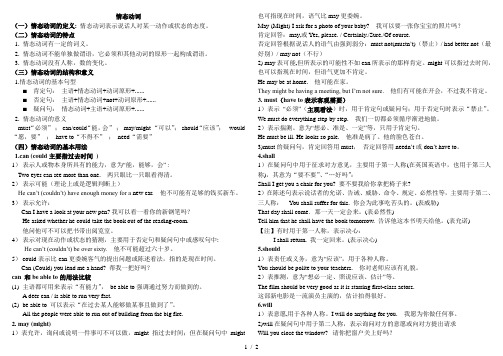
情态动词(一)情态动词的定义:情态动词表示说话人对某一动作或状态的态度。
(二)情态动词的特点1. 情态动词有一定的词义。
2. 情态动词不能单独做谓语,它必须和其他动词的原形一起构成谓语。
3. 情态动词没有人称,数的变化。
(三)情态动词的结构和意义1.情态动词的基本句型⏹肯定句:主语+情态动词+动词原形+......⏹否定句:主语+情态动词+not+动词原形+......⏹疑问句:情态动词+主语+动词原形+......2. 情态动词的意义must“必须”;can/could“能,会”;may/might “可以”;should“应该”;would “愿,要”;have to“不得不”;need“需要”(四)情态动词的基本用法1.can (could主要指过去时间)1)表示人或物本身所具有的能力,意为“能,能够,会” :Two eyes can see more than one. 两只眼比一只眼看得清。
2)表示可能(理论上或是逻辑判断上)He can’t (couldn’t) have enough money for a new car. 他不可能有足够的钱买新车。
3)表示允许:Can I have a look at your new pen? 我可以看一看你的新钢笔吗?He asked whether he could take the book out of the reading-room.他问他可不可以把书带出阅览室。
4)表示对现在动作或状态的猜测,主要用于否定句和疑问句中或感叹句中: He can’t (couldn’t) be over sixty.他不可能超过六十岁。
5)could表示比can更委婉客气的提出问题或陈述看法,指的是现在时间。
Can (Could) you lend me a hand? 帮我一把好吗?can 和be able to的用法比较(1)主语都可用来表示“有能力”,be able to强调通过努力而做到的。
人教版英语初二年级英语英语情态动词知识点含解析(1)
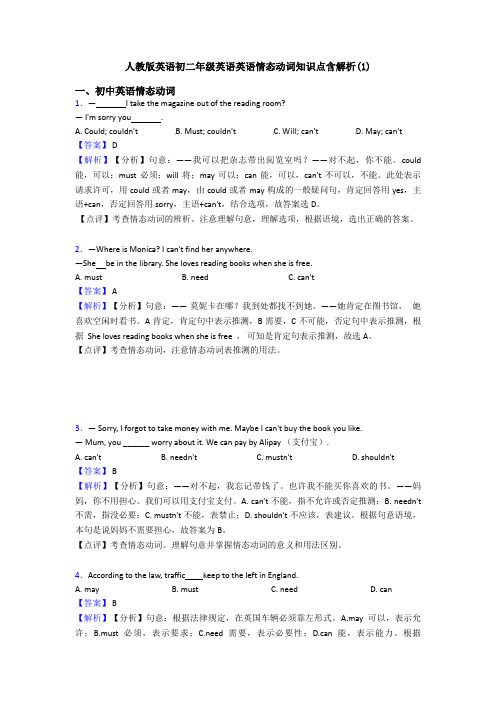
人教版英语初二年级英语英语情态动词知识点含解析(1)一、初中英语情态动词1.— I take the magazine out of the reading room?— I'm sorry you .A. Could; couldn'tB. Must; couldn'tC. Will; can'tD. May; can't【答案】 D【解析】【分析】句意:——我可以把杂志带出阅览室吗?——对不起,你不能。
could 能,可以;must必须;will将;may可以;can能,可以,can't不可以,不能。
此处表示请求许可,用could或者may,由could或者may构成的一般疑问句,肯定回答用yes,主语+can,否定回答用sorry,主语+can't,结合选项,故答案选D。
【点评】考查情态动词的辨析。
注意理解句意,理解选项,根据语境,选出正确的答案。
2.—Where is Monica? I can't find her anywhere.—She be in the library. She loves reading books when she is free.A. mustB. needC. can't【答案】 A【解析】【分析】句意:——莫妮卡在哪?我到处都找不到她。
——她肯定在图书馆,她喜欢空闲时看书。
A肯定,肯定句中表示推测,B需要,C不可能,否定句中表示推测,根据 She loves reading books when she is free ,可知是肯定句表示推测,故选A。
【点评】考查情态动词,注意情态动词表推测的用法。
3.— Sorry, I forgot to take money with me. Maybe I can't buy the book you like.— Mum, you ______ worry about it. We can pay by Alipay (支付宝).A. can'tB. needn'tC. mustn'tD. shouldn't【答案】 B【解析】【分析】句意:——对不起,我忘记带钱了。
人教版英语初二英语英语情态动词知识点总结及解析
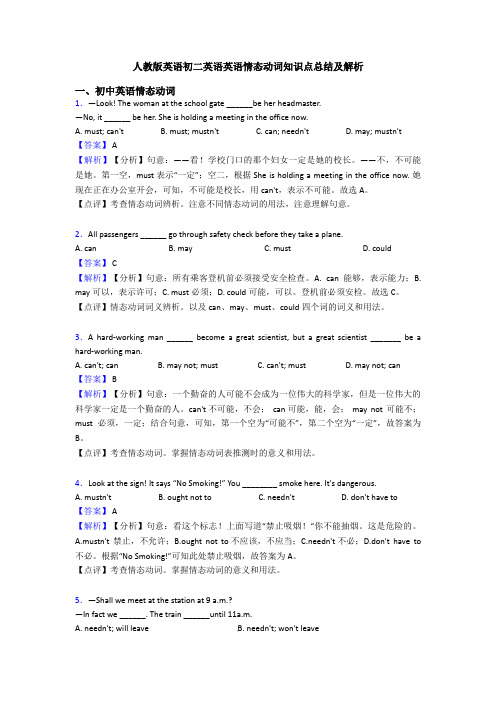
人教版英语初二英语英语情态动词知识点总结及解析一、初中英语情态动词1.—Look! The woman at the school gate ______be her headmaster.—No, it ______ be her. She is holding a meeting in the office now.A. must; can'tB. must; mustn'tC. can; needn'tD. may; mustn't【答案】 A【解析】【分析】句意:——看!学校门口的那个妇女一定是她的校长。
——不,不可能是她。
第一空,must表示“一定”;空二,根据She is holding a meeting in the office now. 她现在正在办公室开会,可知,不可能是校长,用can't,表示不可能。
故选A。
【点评】考查情态动词辨析。
注意不同情态动词的用法,注意理解句意。
2.All passengers ______ go through safety check before they take a plane.A. canB. mayC. mustD. could【答案】 C【解析】【分析】句意:所有乘客登机前必须接受安全检查。
A. can能够,表示能力;B. may可以,表示许可;C. must必须;D. could可能,可以。
登机前必须安检。
故选C。
【点评】情态动词词义辨析。
以及can、may、must、could四个词的词义和用法。
3.A hard-working man ______ become a great scientist, but a great scientist _______ be a hard-working man.A. can't; canB. may not; mustC. can't; mustD. may not; can【答案】 B【解析】【分析】句意:一个勤奋的人可能不会成为一位伟大的科学家,但是一位伟大的科学家一定是一个勤奋的人。
[人教版][八年级下英语专题][第1讲 情态动词]讲义
![[人教版][八年级下英语专题][第1讲 情态动词]讲义](https://img.taocdn.com/s3/m/a54cf6c2482fb4daa58d4bf2.png)
1. 情态动词主要表示说话人的语气和情感,中考考纲要求学生熟练掌握情态动词can; could; may; must; need; should 等的基本用法。
2. 中考有关情态动词的考点主要是情态动词的类型、特征、基本用法和词义辨析,其中以情态动词的基本用法和词义辨析为主。
3. 考查题型主要集中在单项选择、完成句子或句型转换中,有时在完型填空题中也会涉及情态动词的考查。
情态动词在八年级下学期主要是学习could 与should 的基本用法,在各地历年的期中期末试题中,常常将could 与should 和其他情态动词放到一起进行考查,主要考查常见情态动词的词义辨析和用法辨析。
常见考查题型以单项选择为主。
1. 让学生听歌曲,说出歌词大意;2. 分析重点句型,尤其是情态动词could ,would 等;3. 歌名翻译为中文是老鹰之歌,演唱:Paul Simon七上七下八上 八下九上九下can; must; have to; need 基本用法 第1讲 情态动词should; could 的基本用法听力链接:/res-1076-7777700027996.html)I'd rather be a sparrow than a snail.Yes, I would. If I could, I surely would.I'd rather be a hammer than a nail.Yes, I would. If I could, I surely would.Away, I'd rather sail away Like a swan that's here and goneA man gets tied his feet on the groundIt gives the worldIt's saddest sound, It's saddest sound.I'd rather be a forest than a street.Yes I would. If I could, I surely would.I'd rather feel the earth beneath my feet,Yes I would. If I could, I surely would.Away, I'd rather sail away Like a swan that's here and goneA man gets tied his feet on the groundIt gives the worldIt's saddest sound, It's saddest sound.情态动词情态动词could的用法情态动词should的用法情态动词can; must;have to; need; may1. 情态动词表推测时,语气由强至弱:肯定句:must >could >may >might否定句:can’t / couldn’t >may not >might not2. 以can开头的一般疑问句,其肯定和否定回答分别用can和can’t;以could开头的一般疑问句,其肯定和否定回答分别用could和couldn’t。
八年级语法:情态动词的用法
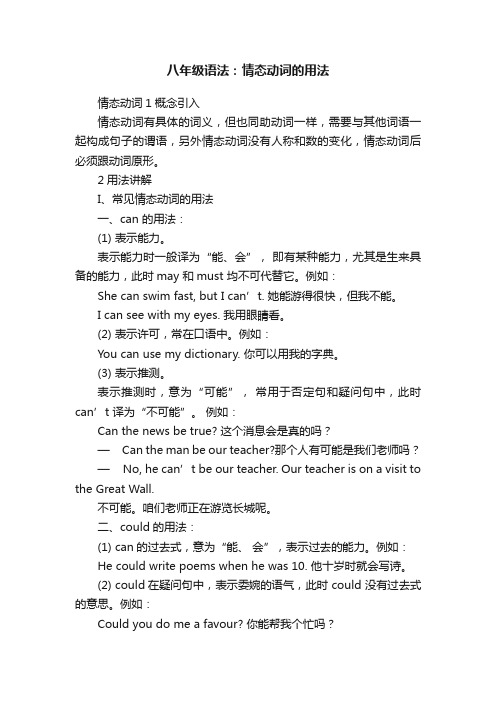
八年级语法:情态动词的用法情态动词1概念引入情态动词有具体的词义,但也同助动词一样,需要与其他词语一起构成句子的谓语,另外情态动词没有人称和数的变化,情态动词后必须跟动词原形。
2用法讲解I、常见情态动词的用法一、can 的用法:(1) 表示能力。
表示能力时一般译为“能、会”,即有某种能力,尤其是生来具备的能力,此时may 和must 均不可代替它。
例如:She can swim fast, but I can’t. 她能游得很快,但我不能。
I can see with my eyes. 我用眼睛看。
(2) 表示许可,常在口语中。
例如:You can use my dictionary. 你可以用我的字典。
(3) 表示推测。
表示推测时,意为“可能”,常用于否定句和疑问句中,此时can’t 译为“不可能”。
例如:Can the news be true? 这个消息会是真的吗?— Can the man be our teacher?那个人有可能是我们老师吗?—No, he can’t be our teacher. Our teacher is on a visit to the Great Wall.不可能。
咱们老师正在游览长城呢。
二、could的用法:(1) can的过去式,意为“能、会”,表示过去的能力。
例如:He could write poems when he was 10. 他十岁时就会写诗。
(2) could在疑问句中,表示委婉的语气,此时 could 没有过去式的意思。
例如:Could you do me a favour? 你能帮我个忙吗?— Could I use your pen? 我能用一下你的钢笔吗?—Yes, you can.可以。
三、may的用法:(1) 表示请求、许可,比can 正式。
例如:May I borrow your bike? 我可以借你的自行车吗?You may go home now. 现在你可以回家了。
- 1、下载文档前请自行甄别文档内容的完整性,平台不提供额外的编辑、内容补充、找答案等附加服务。
- 2、"仅部分预览"的文档,不可在线预览部分如存在完整性等问题,可反馈申请退款(可完整预览的文档不适用该条件!)。
- 3、如文档侵犯您的权益,请联系客服反馈,我们会尽快为您处理(人工客服工作时间:9:00-18:30)。
情态动词(一)情态动词的定义:情态动词表示说话人对某一动作或状态的态度。
(二)情态动词的特点1. 情态动词有一定的词义。
2. 情态动词不能单独做谓语,它必须和其他动词的原形一起构成谓语。
3. 情态动词没有人称,数的变化。
(三)情态动词的结构和意义1.情态动词的基本句型⏹肯定句:主语+情态动词+动词原形+......⏹否定句:主语+情态动词+not+动词原形+......⏹疑问句:情态动词+主语+动词原形+......2. 情态动词的意义must“必须”;can/could“能,会”;may/might “可以”;should“应该”;would “愿,要”;have to“不得不”;need“需要”(四)情态动词的基本用法1.can (could主要指过去时间)1)表示人或物本身所具有的能力,意为“能,能够,会” :Two eyes can see more than one. 两只眼比一只眼看得清。
2)表示可能(理论上或是逻辑判断上)He can’t (couldn’t) have enough money for a new car. 他不可能有足够的钱买新车。
3)表示允许:Can I have a look at your new pen? 我可以看一看你的新钢笔吗?He asked whether he could take the book out of the reading-room.他问他可不可以把书带出阅览室。
4)表示对现在动作或状态的猜测,主要用于否定句和疑问句中或感叹句中: He can’t (couldn’t) be over sixty.他不可能超过六十岁。
5)could表示比can更委婉客气的提出问题或陈述看法,指的是现在时间。
Can (Could) you lend me a hand? 帮我一把好吗?can 和be able to的用法比较(1)主语都可用来表示“有能力”,be able to强调通过努力而做到的。
A deer can / is able to run very fast.(2)be able to 可以表示“在过去某人能够做某事且做到了”。
All the people were able to run out of building from the big fire.2. may (might)1)表允许,询问或说明一件事可不可以做,might指过去时间;但在疑问句中might也可指现在时间,语气比may更委婉。
May (Might) I ask for a photo of your baby? 我可以要一张你宝宝的照片吗?肯定回答:may,或Yes, please. / Certainly./Sure./Of course.否定回答根据说话人的语气由强到弱分:must not(mustn’t)(禁止)/ had better not(最好别)/ may not(不行)2) may表可能,但所表示的可能性不如can所表示的那样肯定。
might可以指过去时间,也可以指现在时间,但语气更加不肯定。
He may be at home. 他可能在家。
They might be having a meeting, but I’m not sure.他们有可能在开会,不过我不肯定。
3. must(have to表示客观需要)1)表示“必须”(主观看法)时,用于肯定句或疑问句;用于否定句时表示“禁止”。
We must do everything step by step. 我们一切都必须循序渐进地做。
2)表示揣测。
意为“想必、准是、一定”等,只用于肯定句。
He must be ill. He looks so pale. 他准是病了。
他的脸色苍白。
3)must的疑问句,肯定回答用must,否定回答用needn’t或don’t have to。
4.shall1)在疑问句中用于征求对方意见,主要用于第一人称(在英国英语中,也用于第三人称),其意为“要不要”、“…好吗”:Shall I get you a chair for you? 要不要我给你拿把椅子来?2)在陈述句表示说话者的允诺、告诫、威胁、命令、规定、必然性等,主要用于第二、三人称:You shall suffer for this. 你会为此事吃苦头的。
(表威胁)That day shall come.那一天一定会来。
(表必然性)Tell him that he shall have the book tomorrow. 告诉他这本书明天给他。
(表允诺)【注】有时用于第一人称,表示决心:I shall return. 我一定回来。
(表示决心)5.should1)表责任或义务,意为“应该”,用于各种人称。
You should be polite to your teachers. 你对老师应该有礼貌。
2)表推测,意为“想必一定、照说应该、估计”等。
The film should be very good as it is starring first-class actors.这部新电影是一流演员主演的,估计拍得很好。
6.will1)表意愿,用于各种人称。
I will do anything for you. 我愿为你做任何事。
2)will在疑问句中用于第二人称,表示询问对方的意愿或向对方提出请求Will you close the window? 请你把窗户关上好吗?17.would1)will的过去式,表示过去时间的“意志、意愿”。
I said I would do anything for you. 我说过我愿意为你做任何事。
2)would用于现在时间,表示比较委婉地提出请求、建议或看法。
Would you like another glass of beer? 再来杯啤酒好吗?8.need1)need作为情态动词,主要用于否定句疑问句;作为实义动词可用于肯定句,否定句或疑问句中。
You needn’t telephone him now.你现在不必打电话给他。
2)回答由need引起的问句时,肯定回答一般用must,否定回答是用needn’t--Need I come? --Yes, you must. --我需要来吗? --需要。
情态动词练习题( ) 1. John___ come to see us tonight, but he isn't very sure yet.A. mayB. canC. has toD. must( ) 2 .They ___ do well in the exam.A. can be able toB. be able toC. can able toD. are able to( ) 3. -May I take this book out? -No, you___.A. can'tB. may notC. needn'tD. aren't( ) 4. You___ go and see a doctor at once because you're got a fever.A. canB. mustC. dareD. would( ) 5. -Can you speak Japanese? -No, I____.A. mustn'tB. can'tC. needn'tD. may not( ) 6. -He___ be in the classroom, I think.-No, he ___ be in the classroom. I saw him go home a minute ago.A. can; may notB. must; may notC. may; can'tD. may; mustn't( ) 7. -Shall I get one more cake for you, Dad? -Thanks, but you___, I've had enough.A. may notB. must notC. can'tD. needn't( ) 8. Even the top students in our class can't work out this problem, so it be very difficult.A. mayB. mustC. canD. need( ) 9. He isn't at school. I think he ___ be ill.A. canB. shallC. mustD. has to( )10. ___ I take this one?A. MayB. WillC. AreD. Do( ) 11. The children___ play football on the road.A. can'tB. canC. mustn'tD. must( ) 12. You ___ be late for school again next time.A. mustn'tB. needn'tC. don't have toD. don't need to( ) 13. -Must I do my homework at once? -No, you___.A. needn'tB. mustn'tC. can'tD. may not( ) 14. His arm is all right. He___ go and see the doctor.A. has not toB. don't have toC. haven't toD. doesn't have to( )15. He had to give up the plan, ___ he?A. didB. didn'tC. doesD. doesn't( ) 16. They had to walk here, ___ they?A. mustn'tB. didC. didn'tD. hadn't( ) 17. He had better stay here, ___ he?A. didn'tB. don'tC. hadn'tD. isn't( )18. You'd better___late next time.A. not to beB. not beC. won't beD. don't be( )19. You'd better ___ your hair ___ once a month.A. had; cutB. had; cuttedC. have; cutD. have; cutted( ) 20. You___ ask that man over there. Maybe he knows the way.A. had better not toB. had not betterC. had betterD. had better not( ) 21. -Shall we go and visit the History Museum next Sunday? -___.A. Here you areB. Sorry, I can'tC. Yes, pleaseD. Let me try( ) 22. -Why don't you ask Mike to go with us? -Thanks, ___.A. I willB. I won'tC. leanD. I may( ) 23. -___ I take the newspaper away? -No, you mustn't. You____read it only here.A. Must; canB. May; canC. Need; mustD. Must; must( ) 24. Excuse me. ___ you please pass me that cup?A. DoB. ShouldC. WouldD. Must( ) 25. ___ you like to have another try?A. CouldB. WillC. WouldD. Do( ) 26. -Would you like to go boating with us?-Yes, ___.A. I'd likeB. I wantC. I'd like toD. I do( ) 27. You___ worry about your son. He will get well soon.A. needn'tB. can'tC. mustn'tD. have to( ) 2 8.The poor man needs our help, ___ he?A. needB. needn'tC. doesD. doesn't( ) 29. -Must we do our homework first? -No, you___. You may have a rest first.A. mustn'tB. needn'tC. may notD. can't( )30.. –I was told to be here before eight.--Oh, you ____. I’m sorry for not telling you that we have changed the plan.A. mustB. can’tC. mayD. needn’t( )31. You ____ write the poem down. Our teacher will give us a copy.A. can’tB. shouldn’tC. needn’tD. mustn’t( )32. We ____ keep the new traffic law and learn how to protect ourselves.A. mayB. shouldC. canD. need( )33. Mrs. Green ____ go to hospital, but now she is in good health.A. has toB. needs toC. used toD. ought to( )34. –Will you answer the phone? It ____ be your mother.--Sorry, I ____. I’m busy.A. can, mustn’tB. will, can’tC. may, can’tD. need, will( )35. There is somebody at the door. ____ I go and see who it is?A. ShallB. MustC. WillD. Would2。
